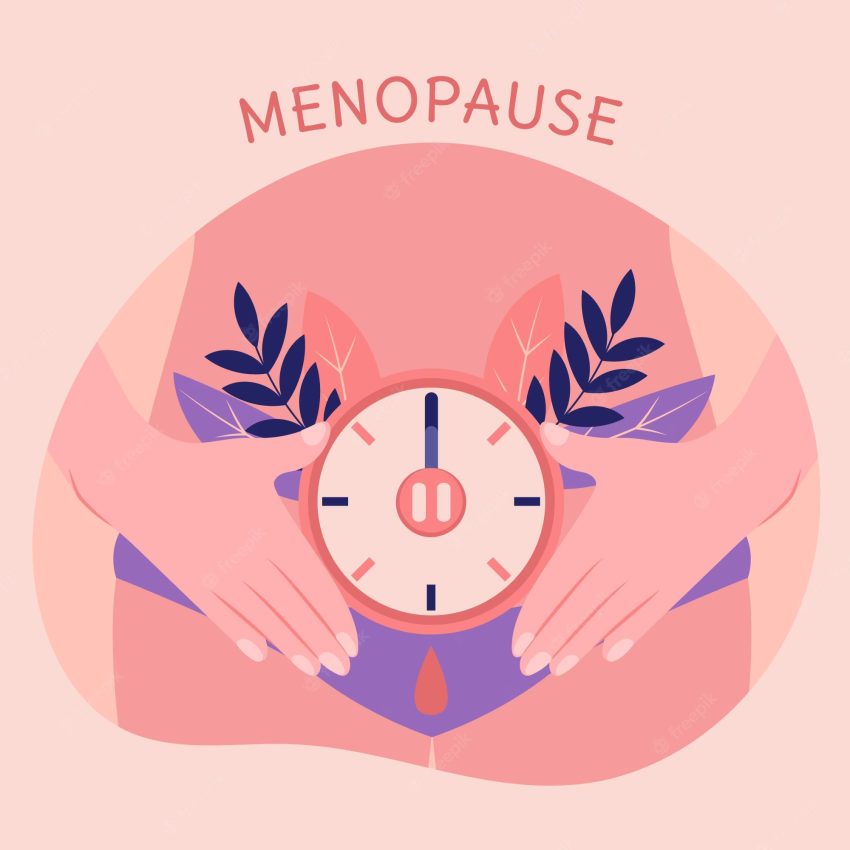Menopause and Mental Health is a natural biological process that marks the end of a woman’s reproductive years. Menopause, a biologically normal process, signals the end of a woman’s fertile years. It is defined as the permanent cessation of menstrual periods for 12 consecutive months and typically occurs between the ages of 45 and 55.
There are several different stages of menopause, including Hormonal shift (the period of time leading up to menopause), menopause itself, and post-menopause. Each stage is associated with different hormonal changes and symptoms.
Menopause and mental health
Menopause can have a significant impact on mental health for some women. Here are some ways that menopause can affect mental health:
1. Mood Changes: Postmenopause can lead to mood changes such as irritability, anxiety, and depression. These changes may be related to hormonal fluctuations or changes in sleep patterns.
2. Sleep Disturbances: Postmenopause can cause sleep disturbances such as insomnia or night sweats, which can lead to fatigue, irritability, and difficulty concentrating.
3. Cognitive Changes: Midlife transition can affect cognitive function, including memory, attention, and processing speed. These changes may be related to hormonal fluctuations or sleep disturbances.
4. Sexual Function: Midlife transition can lead to changes in sexual function, including decreased libido, vaginal dryness, and pain during intercourse. These changes can impact self-esteem and overall quality of life.
5. Body Image: Midlife transition can lead to changes in body composition, including weight gain or changes in body shape. Self-esteem and body image may be affected by these changes.
It’s important to note that not all women will experience these symptoms, and some women may experience them to a greater or lesser degree than others. If you are experiencing significant mental health symptoms related to menopause, it’s important to seek support from a mental health professional or other trusted resource. Treatment options may include hormone therapy, medications, or psychotherapy. Additionally, lifestyle changes such as exercise, stress reduction techniques, and a healthy diet may also be helpful in managing menopause-related symptoms and promoting overall mental health and well-being.
Signs and symptoms of depression during Menopause and Mental Health
Depression is a common mental health concern during Hormonal shifts. Here are some signs and symptoms of depression that women may experience during Hormonal shift
1. Persistent Sadness: Feeling sad, hopeless, or empty for an extended period of time.
2. Loss of Interest: Losing interest in activities that were once enjoyable, such as hobbies, socializing, or sex.
3. Fatigue: Feeling tired or lacking energy, even after getting adequate sleep.
4. Sleep Disturbances: Experiencing difficulty falling or staying asleep, or waking up too early.
5. Changes in Appetite: Significant changes in appetite, such as overeating or loss of appetite.
6. Difficulty Concentrating: Difficulty concentrating, making decisions, or remembering things.
7. Feelings of Guilt or Worthlessness: Feeling guilty or worthless, or having negative thoughts about oneself.
8. Physical Symptoms: Experiencing physical symptoms such as headaches, back pain, or digestive issues.
What are some stress reduction techniques that could help me manage depression during Menopause and Mental Health?
There are several stress reduction techniques that can help manage depression during Ovarian senescence and Mental Health. Here are some examples:
1. Mindfulness: Mindfulness practices such as meditation, deep breathing, or yoga can help reduce stress and improve mood. These practices can help you develop greater self-awareness and emotional regulation and can reduce anxiety and depression symptoms.
2. Exercise: Regular exercise can help reduce stress and improve mood by releasing endorphins and reducing muscle tension. Plan to engage in moderate physical activity for at least 30 minutes most days of the week.
3. Relaxation Techniques: Techniques such as progressive muscle relaxation, guided imagery, or aromatherapy can help reduce stress and promote relaxation. These methods can be used at home or under a therapist’s supervision.
4. Social Support: Spending time with friends and family, or participating in support groups, can help reduce feelings of isolation and promote a sense of belonging. This can be especially important during times of stress or depression.
5. Healthy Habits: Eating a healthy, balanced diet, getting enough sleep, and avoiding alcohol and drugs can help reduce stress and promote overall well-being. These habits can also help manage symptoms of depression during Ovarian senescence
Conclusion
Remember, managing depression during Ovarian senescence is a process that takes time and effort. It’s important to be patient and compassionate with yourself and to seek support from a mental health professional or other trusted resource if needed. By developing stress reduction techniques and practicing self-care, you can improve your mental health and well-being during this time of transition.
You may locate the best online resources for specialists in mental wellbeing through TalktoAngel. To do a search, use this search engine. “online counselor” or psychiatrist near me

